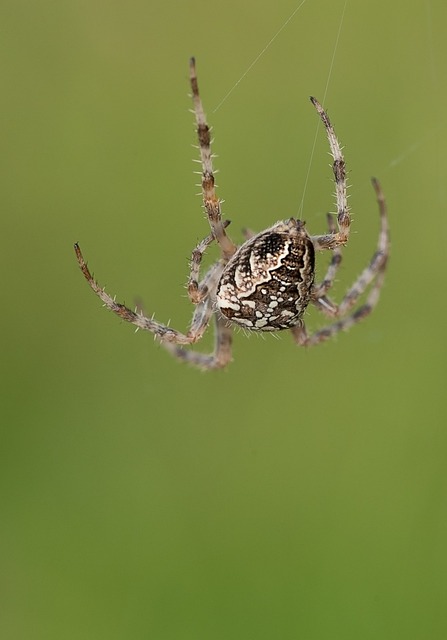Spider infestations pose significant challenges, but proactive measures like sealing entry points, maintaining cleanliness, and using natural repellents can prevent them. Essential oils like citrus, peppermint, and lavender disrupt spiders' sensory systems, while plant-based deterrents offer greener alternatives. Eco-friendly methods include diffusing essential oils, keeping spaces well-lit and clutter-free, and planting herbs with strong scents. Regular inspections and treating early signs of infestation minimize the need for harsh chemical controls. Implementing these natural strategies ensures a safer, more comfortable living or working environment while effectively managing spider infestations.
“Unwelcome spiders can transform your space into a labyrinthine nightmare. But fear not! This article offers a web of eco-friendly solutions for safe spider control, ideal for those seeking natural alternatives to harsh chemicals. We explore effective strategies to understand, prevent, and manage spider infestations without compromising the environment.
From harnessing the power of natural repellents to implementing long-term prevention tactics, discover a greener approach to keeping spiders at bay and reclaiming your living spaces.”
Understanding Spider Infestations and Their Impact
Spider infestations can be a significant concern for homeowners and businesses alike, often leading to unwanted stress and potential health risks. Understanding the dynamics of spider infestation prevention is crucial in mitigating their presence. Spiders are arachnids that thrive in environments with ample hiding spots, such as cracks, crevices, and dark corners. They are naturally drawn to areas offering protection from predators and extreme temperatures.
These creatures play a vital role in eco-systems by controlling insect populations. However, when their numbers surge within human habitats, it can result in discomfort and even pose health hazards, especially for individuals with arachnophobia or allergies. Recognizing the early signs of an infestation is key to effective spider control. This includes identifying egg sacs, webbing patterns, and active spiders. Proactive measures like sealing entry points, maintaining cleanliness, and using natural repellents can significantly deter these eight-legged invaders from establishing a presence in your space.
Natural Repellents and Deterrents: A Green Approach
Spiders, while often seen as pests, can be controlled and prevented using natural repellents and deterrents, offering a greener alternative to chemical-based solutions. Essential oils like citrus, peppermint, and lavender are powerful natural repelents known for their aromatic properties. These scents disrupt spiders’ sensory systems, driving them away from treated areas. Additionally, mixing these essential oils with water and spraying the solution around entry points, windows, and doors can create a barrier that discourages spider infestation prevention.
Plant-based deterrents are another effective strategy in eco-friendly spider control. Peppermint, black pepper, and neem oil have been shown to be effective in repelling spiders. Placing pots of these plants around the home or using neem oil as a topical spray can act as a natural barrier. These methods not only reduce the reliance on synthetic chemicals but also contribute to a healthier indoor environment for residents, promoting a safe and sustainable approach to spider infestation prevention.
Safe and Eco-Friendly Spider Control Methods
When it comes to spider control, many traditional methods involve harsh chemicals that can be detrimental to both your health and the environment. Fortunately, there are several safe and eco-friendly alternatives for spider infestation prevention that are effective and sustainable. One such method is using essential oils like peppermint, tea tree, and citronella, which spiders find repulsive. These natural scents can be diffused or applied topically around entry points to deter spiders without causing any harm.
Another effective approach is maintaining a clean and clutter-free environment. Spiders are attracted to dark, hidden spaces, so keeping areas well-lit and decluttered can significantly reduce their presence. Additionally, using physical barriers like fine mesh screens on windows and doors can prevent spiders from entering your space. Planting certain herbs like lavender, lemongrass, and catnip around the perimeter of your home is another natural spider deterrent, as these plants have distinct scents that keep them at bay.
Long-Term Prevention Strategies for Spider Infestations
To effectively manage and prevent long-term spider infestations, it’s crucial to implement strategic approaches that address their habitat and dietary needs. One key strategy is maintaining a clean and clutter-free environment. Spiders are drawn to spaces filled with hiding spots and organic materials like wood, paper, or fabric. Regularly decluttering homes and businesses reduces these attractants. Additionally, sealing entry points such as cracks, gaps in walls, and windows helps prevent spiders from easily entering buildings.
Another important prevention method involves ensuring proper ventilation and moisture control. Spiders are often found in damp environments, so addressing water leaks and improving airflow can deter them. Using natural repellents like citrus oils or lavender can also be effective without resorting to harsh chemicals. Regular inspections are vital too; identifying and treating spider infestations early significantly eases the need for intensive, potentially harmful control measures.
In light of the above, it’s clear that addressing spider infestations requires a balanced approach. By understanding these creatures and their behaviors, we can implement eco-friendly solutions for safe and effective spider control. Utilizing natural deterrents, adopting long-term prevention strategies, and embracing safer methods ensures a harmonious coexistence with these arachnids while protecting our health and the environment. Remember that proactive measures, such as regular cleaning and sealing entry points, are key to preventing spider infestation in the first place.
